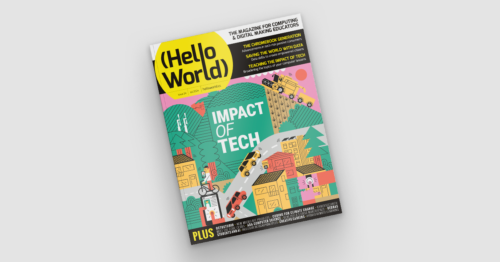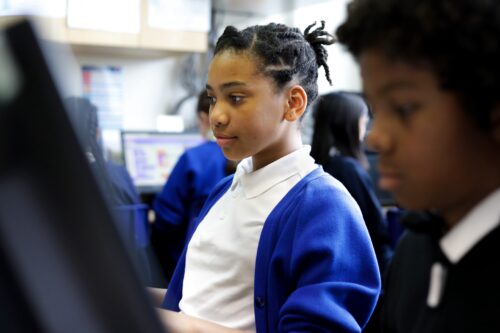Hello World #24 out now: Impact of tech
Do you remember a time before social media? Mobile phones? Email? We are surrounded by digital technology, and new applications impact our lives whether we engage with them or not. Issue 24 of Hello World, out today for free, gives you ideas for how to help your learners think openly and critically about technology.

Teaching about the impact of technology
For learners to become informed, empowered citizens, they need to understand the impact technology has on them as individuals, and on society as a whole. In our brand-new issue of Hello World, educators share insights from their work in and around classrooms that will help you engage your learners in learning about and discussing the impact of tech.
For example:
- Jasmeen Kanwal and the team at Data Education in Schools share their resources for how young people can start to learn the skills they need to change the world with data
- Julie York writes about how incorporating AI education into any classroom can help students prepare for future careers
- Ben Hall discusses whether technology is divisive or inclusive, and how you can encourage students to think critically about it

This issue also includes stories on how educators use technology to create a positive impact for learners:
- Yolanda Payne tells you how she’s using teaching experiences from the COVID-19 pandemic to bring better remote learning to communities in Georgia, USA, and in the US Virgin Islands
- Mitchel Resnick and Natalie Rusk from Lifelong Kindergarten group at MIT Media Lab introduce their new free mobile app, OctoStudio, and how it helps learners and educators in underresourced areas get creative with code
And there is lots more for you to discover in issue 24.
The issue also covers how you can make time to teach about the impact of technology in an already packed curriculum. Sway Grantham, Senior Learning Manager at the Raspberry Pi Foundation, says in her article:
“As adults, it is easy for us to see the impact technology has had on society and on our lives. Yet when I tell pupils that, within my lifetime, it wasn’t always illegal to hold your mobile phone to your ear and have a call while driving, they are horrified. They are living in the now and don’t yet have the perspective to allow them to see the change that has happened. However, knowing the impact of technology allows us to learn from previous mistakes, to make decisions around ethical behaviour (such as using a phone while driving), and to critically engage in real-world issues.
As teachers, allocating some time to this topic throughout the year can seem challenging, but with a few small changes, the impact might be more than you can imagine.”
Share your thoughts & subscribe to Hello World
With so many aspects of life impacted by technology, computing educators play a crucial role in supporting young people to become informed, empowered citizens. We hope you enjoy this issue of Hello World and find it useful in your teaching.
- Share your thoughts and ideas about the new issue and the topic on social media by tagging the Hello World Twitter/X or Facebook accounts
- Find out how you can write for the magazine
- Subscribe to Hello World for free to never miss an issue
The post Hello World #24 out now: Impact of tech appeared first on Raspberry Pi Foundation.

